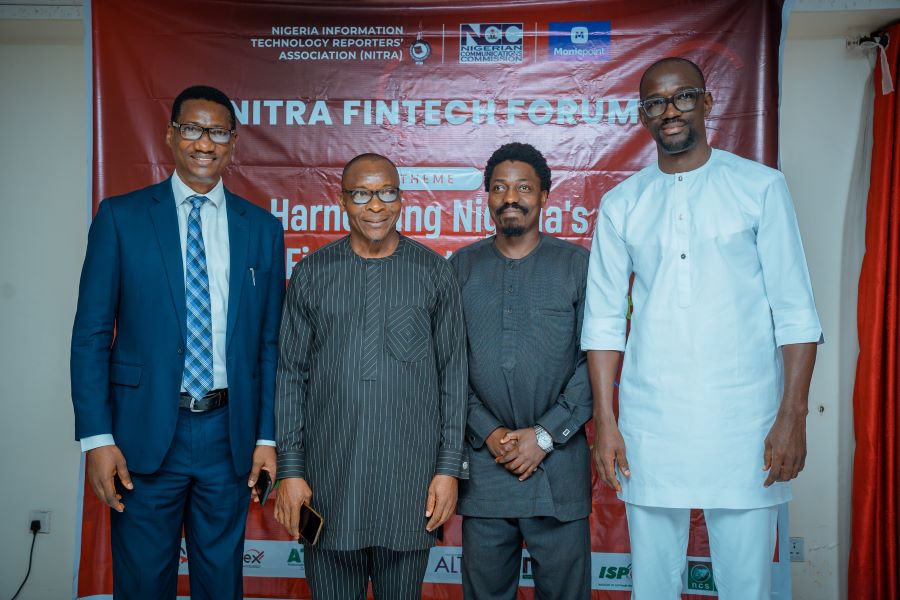E-Financial
Moniepoint Restates Commitment to Financial Inclusion in Nigeria

Moniepoint MFB, leading Fintech company in Nigeria, has restated its commitment to driving financial inclusion through innovative products that address payment challenges in the country.

L-R: Mr. Henry Ojiokpota; Lagos Zonal Controller and representative of the EVC/CEO, Nigerian Communications Commission (NCC), Dr. Aminu Maida, Mr. Chike Onwuegbuchi; Chairman of NITRA, Bemigho Awala; PR Manager for MoniePoint Inc,and Efemena Ogie, Head of Partnerships Moniepoint Inc at the NITRA Fintech Forum in Lagos.
Efemena Ogie, Head of Partnerships at Moniepoint Inc, stated this at a Fintech Forum organized by the Nigeria Information Technology Reporters Association (NITRA) in Lagos.
According to Ogie, it was in line with this commitment that the company developed an innovation of PoS alert for mobile transfers.
According to him, this is helping businesses using Moniepoint’s PoS machines to receive instant credit alerts when their customers make transfers to their accounts. He said this has also taken the customers’ burden of waiting for merchants to receive alerts before they can leave.
Explaining the innovation, Ogie said: “We had to think outside the box to make life easy when you want to make payments. If you go to a supermarket and you forget your card and you want to make a payment, you will have to make a transfer.
“But at some point, you have to wait until the merchant gets an alert before you can leave. You can just get angry at that point because your account has been debited.
“We saw that there is a better way to do that, so what we did was that instead of waiting, when you do a transfer, the alert should just hit the PoS, and that transaction will be seen as a card transaction and the merchant is able to print your receipt right there.”
Ogie added that more innovations are coming into the payment space in Nigeria, especially with the ongoing implementation of the Central Bank of Nigeria’s Payment System Vision 2025.
“In a couple of months from now, you’re going to see some massive innovation in the payment space because if you look at the CBN’s Payment System Vision 2025, in the documents, you have things like big data, artificial intelligence, contactless payments, and open banking.
“As we are talking, the CBN has also released the guidelines for open banking, so it’s not something that will happen in 10 years but it’s happening right now.
“The CBN has also released the circular for contactless payments. At Moniepoint, we are already working for our customers, we are already thinking outside the box to see how we can deploy services around these platforms,” Ogie said.
In his opening remarks at the Forum themed “Harnessing Nigeria’s Fintech Potentials: Challenges and Opportunities”, the Chairman of NITRA, Mr. Chike Onwuegbuchi noted that fintech has become the most exciting sector in the ICT industry, and in Nigeria as a whole.
He added that the focus on the sector which is seen as the engine of financial dealings, economic growth, and transactional unification, was to present and aid various other sectors from the grassroots to international business/trade.
Bemigho Awala, PR Manager for MoniePoint Inc, used the forum to share perspectives around how opportunities in Nigeria’s fintech space can be robustly captured.
He cited the need for increased talent development in the industry while signposting Moniepoint NITHub initiative as an exemplar.
Awala also made the case for innovative systems, enhanced due diligence and innovative solutions that meet market demand as critical pillars that undergird the emergence of a fintech ecosystem that works for all stakeholders.
“Know Your Customer” (KYC) has become a cornerstone in establishing trust, ensuring security, and complying with regulatory standards. KYC is not merely an acronym; it represents a crucial set of processes designed to verify and authenticate the identity of customers engaging in financial transactions.
“As a responsible and compliant organization, we will continue to explore innovative tools and methodologies while actively collaborating and cooperating with all stakeholders in the financial services value chain to reduce the menace of fraud-related transactions”, Awala said.
E-Financial
Sterling Bank Pledges ₦2bn to Fully Fund University Scholarships

Sterling Bank has launched a ₦2 billion scholarship initiative to support Nigerian students in private universities. The program, Beyond Education, was unveiled on Democracy Day and aims to remove financial barriers to higher learning.

The bank will fully sponsor 600 students from across Nigeria’s 36 states and the FCT to study Technology, Finance, Sales, and Public Health at Miva University, founded by Sim Shagaya. The selection process is merit-based, with candidates nominated by themselves or others, and final selection determined through public voting open to Sterling account holders.
Sterling Bank’s CEO, Abubakar Suleiman, described the initiative as an investment in Nigeria’s future, aligning with the bank’s commitment to Health, Education, Agriculture, Renewable Energy, and Transportation. The bank has already deployed over half a trillion naira in financing across these sectors.
According to Obinna Ukachukwu, Growth Executive at Sterling Bank, the program is about creating opportunities beyond education. The bank is shifting from short-term philanthropy to long-term ecosystem development, with investments in digitized healthcare, school financing, agricultural cooperatives, solar energy, and transport systems.
“Nigeria’s progress requires action,” Suleiman said. “We are funding the future architects of the country—those who will build the businesses, institutions, and innovations needed for national prosperity.”
Nominations for the Beyond Education scholarships are now open at www.sterling.ng/FUTURE. The initiative sets a precedent for private-sector-driven education investment, where success is measured not just in profit, but in people empowered.
E-Financial
FG to Train 100,000 Youths Annually in Forex Trading and Financial Skills

Federal Government of Nigeria has signed a Memorandum of Understanding (MoU) with Investonaire Academy to train 100,000 young Nigerians annually in forex trading, financial planning, and risk management.

The agreement, signed in Abuja, was announced by Omolara Esan, Director of Information and Public Relations at the Federal Ministry of Youth Development. According to her, the initiative is part of the government’s broader strategy to reduce youth unemployment and enhance financial inclusion.
At the signing ceremony, Minister of Youth Development, Comrade Ayodele Olawande, described the partnership as a milestone in the ministry’s efforts to equip young Nigerians with practical financial skills. He emphasized that the programme would foster critical thinking, improve digital literacy, and expand access to global economic opportunities.
Speaking on the collaboration, Dr. Enefola Odiba, International Programme Director at Investonaire Academy, highlighted the importance of empowering youth with relevant financial and digital skills. He described young people as essential drivers of innovation and national development.
The ministry assured that the programme would be implemented with transparency and measurable outcomes, ensuring that participants gain practical expertise in forex trading and financial planning.
The Federal Government has recently intensified efforts to boost skill development across various sectors. A separate plan aims to train 100,000 artisans nationwide, following the successful upskilling of 29,000 individuals in previous phases. This initiative seeks to professionalize vocational trades, eliminate quackery, and introduce licensing systems.
Additionally, technicians from specialized institutions will receive industry-standard training to strengthen Nigeria’s labor force and increase self-reliance in skilled professions.
Through these efforts, the government hopes to position Nigerian youth for economic success both locally and globally.
E-Financial
NDIC Begins Final Settlements to Creditors of Liquidated Premier Bank

Nigeria Deposit Insurance Corporation (NDIC) has begun the final phase of liquidation for the defunct Premier Commercial Bank, initiating the payment of liquidation dividends to verified creditors, nearly 25 years after the bank’s closure.

Premier Commercial Bank had its operating license revoked by the Central Bank of Nigeria (CBN) on December 20, 2000, following findings of financial instability and regulatory non-compliance.
Since then, the NDIC has overseen the bank’s liquidation process under a winding-up order from the Federal High Court, which designated the corporation as the official liquidator.
In a public announcement, the NDIC invited all eligible creditors to visit any of its zonal offices between June 2 and June 27, 2025, to verify and claim their entitlements.
This move marks a critical milestone in the final settlement of claims related to the bank’s collapse.
To facilitate the verification process, creditors are required to present proof of deposit or shareholding, such as a passbook, chequebook, term deposit certificate, or bank statement.
Additionally, valid identification documents must be submitted, including a driver’s license, international passport, national identity card, NIN slip/card, voter’s card, or a formal identification letter from a traditional ruler or local government chairman.
The NDIC assured the public that the ongoing settlement is part of a broader effort to bring closure to longstanding claims resulting from Premier Commercial Bank’s liquidation. The process, according to the corporation, has been designed to ensure efficient disbursement to all verified stakeholders.
Premier Commercial Bank is one of 53 deposit money banks whose licenses were revoked by the CBN between 1994 and 2018 due to various violations and signs of financial distress.
These closures were followed by legal procedures appointing the NDIC to manage asset recoveries and creditor settlements.
By initiating this final phase of payment, the NDIC is reaffirming its commitment to financial system stability and depositor protection while calling on all affected individuals and institutions to complete verification processes promptly to receive their due compensation.

 General News2 days ago
General News2 days agoAfDB to Provide $184.1mfor Africa’s Largest Solar Energy, Battery Storage Project

 News2 days ago
News2 days agoReport Reveals New Malware Posing as an AI Assistant Steals User Data

 General News2 days ago
General News2 days agoCourt Declines Access Bank’s Request to Freeze MTNN Account over N180Bn Claims

 Telecom2 days ago
Telecom2 days agoMTN Mulls Establishment of Fintech Firm in Nigeria, Others

 News2 days ago
News2 days agoAliko Dangote Signs out @ Dangote Sugar Refinery as Chairman

 E-Business2 days ago
E-Business2 days agoFG Mulls Fibre Optic Layout to Bridge Internet Gaps

 E-Financial2 days ago
E-Financial2 days agoFG to Train 100,000 Youths Annually in Forex Trading and Financial Skills

 E-Financial1 day ago
E-Financial1 day agoSterling Bank Pledges ₦2bn to Fully Fund University Scholarships

























